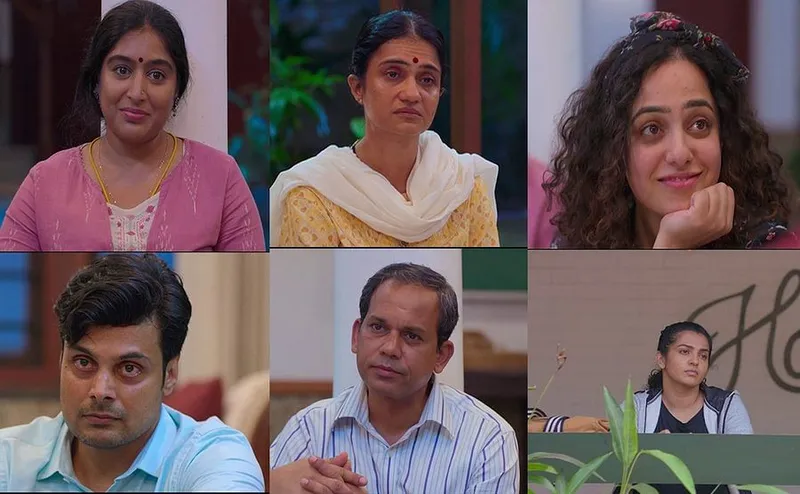Anjali Menon’s movies are like rays of sunshine—full of warmth and love. Take, for instance, her 2014 film Bangalore Days, which was my introduction to the fascinating world of Malayalam cinema. The movie—even after eight years—still remains endearing and strikes all the right chords. The actors who have worked with Anjali say this warmth exudes from the director herself.
Her latest movie, Wonder Women, too has the familiar touches of warmth and subtle nuances, though one wishes they could have lingered longer. The movie deals with the subject of childbirth and how little we know about the journey of expectant mothers. It also shines light on what being pregnant means—not just to the women but also to expectant fathers.
While the film may seem like a warm hug from your pals, with its easy flow and mellow moments, it also negotiates less-traversed, difficult paths.
In Wonder Women, Anjali, who has also written the film, explores different aspects of pregnancy and motherhood—the anxiety and confusion of mothers-to-be, the impact of miscarriage, and the challenges of being a single mother.
The movie, which is set in Kerala, relies largely on English for the characters to communicate with each other. The women characters—played by Nadiya Moidu, Nithya Menen, Parvathy Thiruvothu, Padmapriya, Sayonara Philip, and Amruta Subhash—belong to Kerala, Bengaluru, probably Hyderabad, Coimbatore, Goa, and Satara, respectively. Apart from English, they also speak their native languages.

(Actors clockwise from top left) Padmapriya, Amruta Subhash, Nithya Menen, Parvathy Thiruvothu, Sandesh Kulkarni, and Srikanth K. Vijayan. Image Credit: Twitter
The ease with which Amruta portrays the character of Jaya, a woman from a small town—with all her innocence and clumsiness—is both funny and charming. At the same, she also asserts herself, when she needs to, with aplomb.
Watch out for the scene in which Jaya, a Marathi-speaking woman from Satara, is not able to comprehend the languages spoken around her and says she doesn’t understand “Madrasi”.
What follows is a mild altercation and a ‘knowledge imparting session’ from the South Indian women in the room, which will surely bring a sigh of relief to the people south of the Vindhyas.
Wonder Women also dwells on the complexities of relationships between couples. Nora’s (played by Nithya Menen) husband Sanjay cannot relate to his partner anymore, while Umesh (Sandesh Kulkarni) cares only about the wellbeing of his wife Jaya, who has had three miscarriages. Parvathy Thiruvothu plays a single mother, while Sayonara Philip’s character lives with her partner.
Anjali seems to believe in the less-is-more philosophy. There is a scene in which the expecting couples are learning how to hold and cradle their babies. Only a few lines are exchanged between the couples, but they are able to convey a lot—about their equation with one another and their unborn baby—through just their expressions.
Thankfully, the movie stays away from the meandering trope of a bunch of women meeting in a pregnancy class.
Praveen Prabhakar’s crisp editing keeps the narrative tight and your attention intact. The screenplay moves at a leisurely pace, but it never feels boring. Govind Vasantha’s soft musical score adds a genteel touch to the tale.
The close-up shots, by cinematographer Manesh Madhavan, deserve special mention for they beautifully depict a range of emotions that words cannot convey. The movie’s aesthetics also get our nod—with beautiful shots of beaches and old bungalows nestled among trees. In fact, some of the scenes appear straight out of a picture book.
But, just as I was getting invested in the characters and their lives, the movie seemed to end abruptly, leaving me a bit unsatiated and longing for more.
The director could have taken the time to flesh out some of the themes she has attempted to address—such as absentee fathers and miscarriage. While pregnancy coach Nandita (played by Nadiya Moidu) talks about being relaxed during labour, there isn’t a dialogue around postpartum depression. Some of the complicated scenes are resolved very quickly, with very little deliberation or debate.
Nevertheless, the movie manages to start a conversation around pregnancy and childbirth and how the journey is different for each individual.
“For me, this is just an opening where I am showing it (journey through pregnancy) in a very light way. Because if I go into showing really how it is, everyone is going to want to tune out of it. I would rather start in a light way and then explore it with more depth,” said the director in an interview recently.



![Read more about the article [Funding alert] Infra.Market joins the unicorn club, raises $100 million in a Series C round led by Tiger Glob](https://blog.digitalsevaa.com/wp-content/uploads/2021/02/Imageopwm-1611036451768-300x150.jpg)






